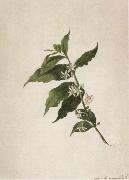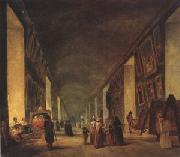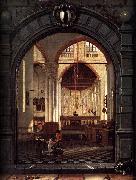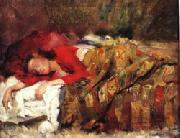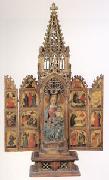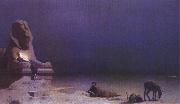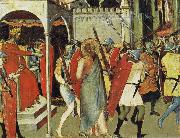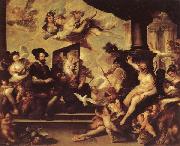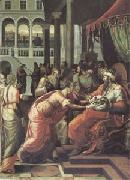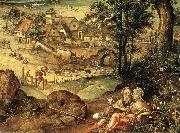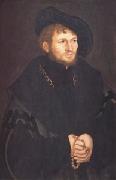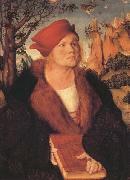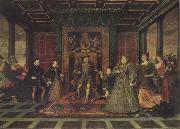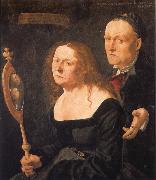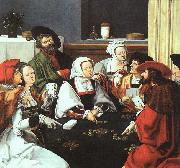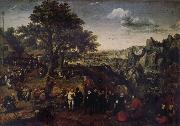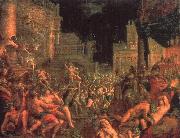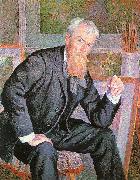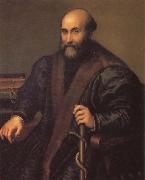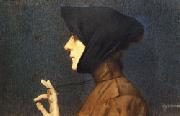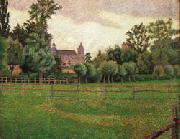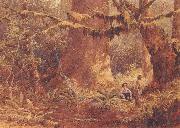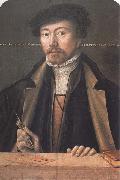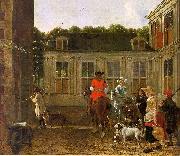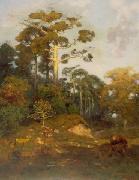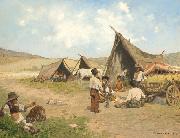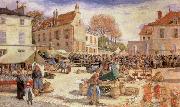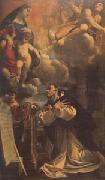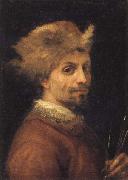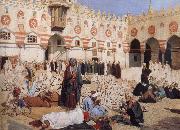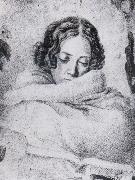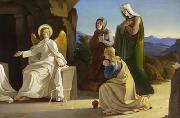|
|
|
|
 |
Louise-Catherine Breslau
|
|
(6 December 1856 - 12 May 1927) was a German/Swiss artist.
Born Maria Luise Katharina Breslau in Munich, Germany, she spent her childhood in Zurich, Switzerland and as an adult made Paris, France her home. Suffering from asthma all her life, Breslau turned to drawing as a child to help pass the time while confined to her bed. Although she became one of the most sought after portraitists of her time, after her death she and her work were all but forgotten. It has only been in the past few years that interest in Breslau and her works has been growing.
Breslau was born into a prosperous bourgeois family; her father was a well-respected physician specializing in obstetrics and gynecology. When Breslau was two years old, her father accepted the position of professor and head physician of Obstetrics and Gynecology at the University of Zurich; Switzerland became home to the Breslau family. |
|
|
|
|
|
|
|
|
|
|
|
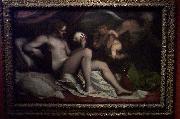 |
Luca Cambiaso
|
|
Luca Cambiasi (surname also written Cambiaso or Cangiagio; 1527 - 1585) was an Italian painter and draftsman, familiarly known as Lucchetto da Genova.
|
|
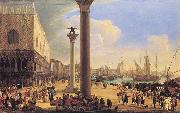 |
Luca Carlevarijs
|
|
Luca Carlevarijs or Carlevaris (20 January 1663 - 12 February 1730) was an Italian painter and engraver of landscapes (vedutista).
Carlevarijs was born in Udine, but worked mostly in Venice. His vedute of Venice are among the earliest Baroque depictions of the city. He was influenced by the Dutch painter active in Rome, Caspar van Wittel (often called Vanvitelli). The painters Canaletto and Antonio Visentini are said to have been highly influenced by or pupils of his. Johan Richter did work with him. Also called Luca Casanobrio or Luca di Ca Zenobri, for his patronage by the latter family.
He painted landscapes, sea-pieces, and perspective views. He completed over a hundred etchings of views in Venice, which give an exact representation of the principal places in that city. He died in Venice. |
|
|
|
|
|
|
|
|
|
|
|
|
|
|
|
|
|
|
|
|
|
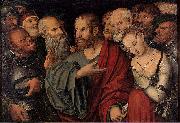 |
Lucas Cranach the Younger
|
|
(October 4, 1515 ?C January 25, 1586) was a German Renaissance artist, known for his woodcuts and paintings.
He was a son of Lucas Cranach the Elder who began his career as an apprentice in his father's workshop. Henceforth, his own reputation and fame grew. After his father's death, he assumed control over the workshop.
The style of their paintings can be so similar that there have been some difficulties in attribution of their works. |
|
|
|
|
|
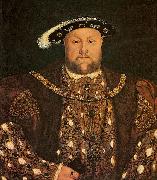 |
Lucas Horenbout
|
|
Lucas Horenbout, often called Hornebolte in England, (Ghent c. 1490 to 1495 - London 1544) was a Flemish artist who moved to England in the mid-1520s and worked there as "King's Painter" and court miniaturist to King Henry VIII from 1525 until his death. He was trained in the final phase of Netherlandish illuminated manuscript painting, in which his father Gerard was an important figure, and was the founding painter of the long and distinct English tradition of portrait miniature painting. He has often been suggested as the Master of the Cast Shadow Workshop, who produced royal portraits on panel in the 1520s or 1530s.
Horenbout trained in Ghent with his father, Gerard Horenbout, becoming a Master of the local Guild of Saint Luke in 1512. Gerard was an important Flemish manuscript illuminator in the dying days of that art-form, who had been court painter, from 1515 to about 1522, to Margaret of Austria, Regent of the Netherlands. Margaret was twice sister-in-law to Catherine of Aragon, still Henry's (first) Queen when the Horenbouts came to England. Gerard is sometimes identified with the "Master of James IV of Scotland", one of the many artistic personalities identified as a significant illuminator in the Ghent-Bruges school of the period, to whom no historical person can be attached.
Horenbout came over to England at an unknown date with, or perhaps before, his sister Susanna and his father. It has been suggested that their move was in connection with an attempt by the King, or possibly Cardinal Wolsey, to revive English manuscript illumination by establishing a workshop in London, but this is controversial. His father Gerard is first recorded in England in 1528, and later returned to the Continent, probably after 1531; he had died in Ghent by 1540. Susanna, who was also an illuminator, is recorded in 1529 as married to a John Palmer and in England.
Lucas is documented in England from September 1525, when he was first paid by the King as "pictor maker". By 1531 he was described as the "King's Painter", and this appointment was confirmed for life in June 1534, when he became a "denizen" - effectively a naturalised citizen. Horenbout was very well paid, at sixty-two pounds and ten shillings (but only thirty-three pounds and six shillings according to Richard Gay) per year, a "huge" sum according to Strong, and better than Holbein's thirty pounds a year in his period as Henry's court painter. He was granted a "tenement" in Charing Cross, and permitted to take on four foreign journeyman. Lucas was buried at Saint Martin in the Fields and left a wife and daughter, Margaret and Jacquemine. Margaret was paid sixty shillings three years later by Queen Catherine Parr for some paintings. |
|
|
|
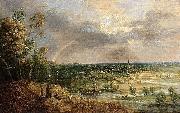 |
Lucas van Uden
|
|
(18 October 1595 - 4 November 1672) was a Flemish Baroque painter specializing in landscapes.
Lucas van Uden was born in Antwerp, where he entered the guild of St. Luke in 1626-27. Although he was never part of Peter Paul Rubens's studio, his works are partly indebted to that master. Van Uden even made copies of Rubens's works on several occasions. His technique, however, owes as much to earlier painters like Joos de Momper and Jan Brueghel the Elder. General characteristics are a tonally-green recessive view punctuated by slender trees and populated by incidental pastoral and peasant figures. Many of Van Uden's figures were either copied from Rubens or painted by David Teniers the Younger. He is often associated with fellow landscape painter Jan Wildens.
|
|
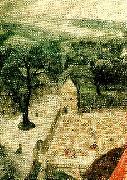 |
lucas van valchenborch
|
|
Lucas van Valkenborch (also "Valckenborch," "Valkenborgh") (c. 1535, Leuven - February 2, 1597, Frankfurt am Main), was a member of a family of Flemish landscape and genre painters. |
|
|
|
|
|
|
|
|
|
|
|
|
|
|
|
|
|
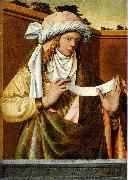 |
Ludger tom Ring the Younger
|
|
(1522-1584) was a German painter and draughtsman.
Ring was born in Menster. His father and brothers were also painters. Ring primarily painted portraits and still lifes. He died in Braunschweig in 1584.
|
|
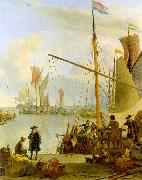 |
Ludolf Backhuysen
|
|
b.Dec. 18, 1631, Emden, East Frisia [Germany]
d.Nov. 17, 1708, Amsterdam, Neth.
Dutch
Ludolf Backhuysen Gallery |
|
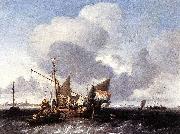 |
Ludolf Bakhuizen
|
|
(December 28, 1630 - November 17, 1708) was a German-born Dutch Golden Age painter who was the leading Dutch painter of maritime subjects after the two Willem van de Veldes (father and son) left for England in 1672.
He was born in Emden, East Frisia, and came to Amsterdam in about 1650, working as a merchant's clerk and a calligrapher. He discovered so strong a genius for painting that he relinquished the business and devoted himself to art from the late 1650s, initially in pen drawings. He studied first under Allart van Everdingen and then under Hendrik Dubbels, two eminent masters of the time, and soon became celebrated for his sea-pieces, which often had rough seas.
He was an ardent student of nature, and frequently exposed himself on the sea in an open boat in order to study the effects of storms. His compositions, which are numerous, are nearly all variations of one subject, the sea, and in a style peculiarly his own, marked by intense realism or faithful imitation of nature. In his later years Bakhuizen employed his skills in etching; he also painted a few examples each of several other genres of painting, such as portraits, landscapes and genre paintings. |
|
|
|
|
|
|
|
|
|
|
|
|
|
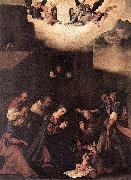 |
Ludovico Mazzolino
|
|
(1480 - c. 1528) - also known as Mazzolini da Ferrara, Lodovico Ferraresa, and Il Ferrarese - was an Italian Renaissance painter active in Ferrara and Bologna.
He was born and died in Ferrara. He appears to have studied under such as Lorenzo Costa, who also trained Dosso Dossi and Cosimo Tura, and came under the influence of Ercole Roberti. In 1521 he married Giovanna, the daughter of Bartolomeo Vacchi, a Venetian painter. Much of his work was commissioned by the duke Ercole I d'Este from Ferrara. Mazzolino was influenced by il Garofalo and Boccaccino. He is known for devotional cabinet pictures, in a style somewhat regressive, or primitive, relative to the modern classicism then emerging. For example, his Massacre canvas has a turbulent and cartoonish crowding.
The exact date, or even year, of his death is not known, but he died during a plague which devastated the area.
|
|
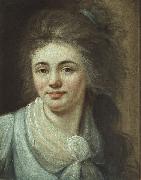 |
Ludovike Simanowiz
|
|
Deutsch: Friedrich Schiller (1759 - 1805), Ölgemälde von Ludovike Simanowiz 1793/94
English: Friedrich Schiller, German poet, philosopher, historian, and dramatist |
|
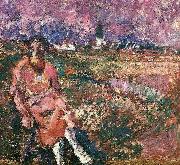 |
ludvig karsten
|
|
(Ludvig Peter Karsten), född 8 maj 1876 i Oslo, död 19 oktober 1926 i Paris, var en norsk målare. Han räknas som en av de viktigaste efterföljarna till Edvard Munch och räknades som en ledande impressionist. |
|
|
|
|
|
|
|
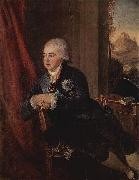 |
Ludwig Guttenbrunn
|
|
Ludwig Guttenbrunn (1750 - 1819) was an artist who worked in the latter part of the 18th century and early 19th century. He specialized in portraiture and history painting. |
|







